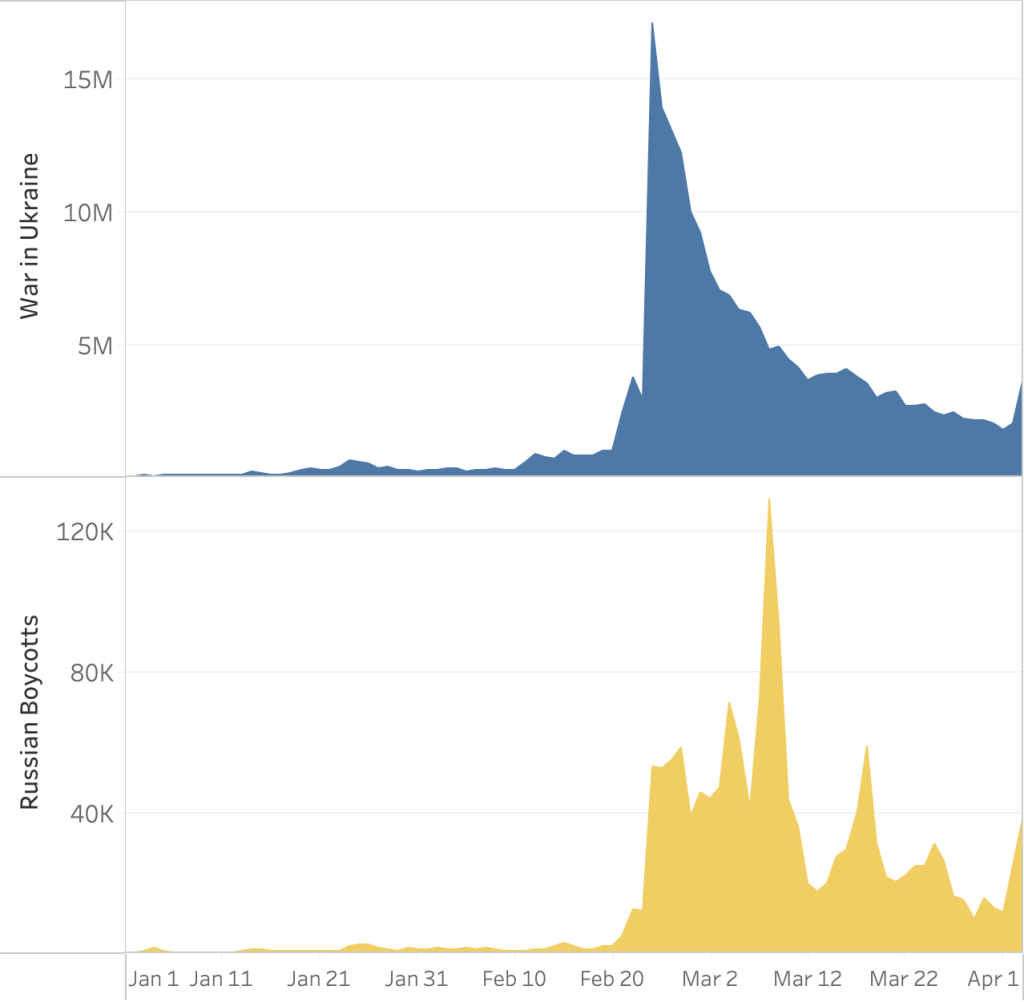Analysis by Prof. Jura Liaukonyte (Cornell). Research Assistants: Juraj Stelmach (Cornell) & Ngodoo Zume (Northwestern)
I thank prof. Olena Rarytska (Cornell) for assisting in the tobacco tax analysis and for translating relevant documents from Russian.
Top-50 foreign companies’ statements analysis
We analyzed the press releases of the top 50 multinational companies (by revenue) operating in Russia and evaluated their level of commitment to withdraw their businesses from Russia.
Companies’ actions can be considered committed if the company meets one of the following conditions:
- halts exports and imports
- exits the market
- its action in the Russian market lowers its financial forecasts
- foregoes market share gains or loses market share
Companies’ actions can be considered to show weak or partial commitment if the company only meets the following conditions:
- stop in R&D
- stop advertisements or marketing activities of any kind
- stop in capital investments
- opportunistic closure or scale back due to other factors than war in Ukraine
All of the companies that provide essential goods and services that might have a humanitarian exception are classified separately. We note that even within those companies, the level of commitment varies significantly.
Link to the table for full analysis. Main takeaways:
- 26% of companies show weak commitment
- 16% continue to operate
- 34% show committed actions
- 24% classified as having a humanitarian obligation
Tobacco Tax analysis
- Federal budget of the Russian Federation information comes from the Ministry of Finance of the Russian Federation
- In 2020 the total budget was 18.719 trillion rubles.
- Defense expenditure was 3.169 trillion rubles in 2020 [lower bound]
- When calculating Russia’s military expenditure Stockholm International Peace Institute experts include other items from other budget headings and estimate the military expenditure to be 4.211 trillion rubles (latest data for 2019) [upper bound]
- PMI taxes information comes from PMI Russia Sustainability Report (2020):
- Page 12, 3rd number in the first row says “216 billion rubles is the amount of taxes paid to the budgets of all levels in 2020”
- This is equivalent to 216/18719=1.15% of the total budget
- This is equivalent to 216/4211=5.13% of the defense budget [lower bound]
- This is equivalent to 216/3169=6.82% of the military budget [upper bound]
- JTI taxes information comes from their website:
- “In 2020, the company’s tax payments provided 1.4% of the total revenue of the Russian Federation state budget”
- This is equivalent to (1.4%*18719)/4211=6.22% of the defense budget [lower bound]
- This is equivalent to (1.4%*18719)/3169=8.27% of the military budget [upper bound]
- Thus the total contribution of the two tobacco companies is:
- 1.15%+1.4%=2.55% of the total federal budget
- 5.13%+6.22%=11.3% of defense budget [lower bound]
- 6.82%+8.27%=15.1% of military budget [upper bound]
Twitter chatter analysis
Next, we analyzed Twitter chatter relating to the two topics: (1) War in Ukraine and (2) Russian Boycotts. Data source: Academic Twitter API
- The top panel of the graph below shows the number of daily tweets that have content related to the Russian invasion of Ukraine
- The bottom panel of the graph below shows the number of daily tweets that have content related to Russian boycotts.
- Both panels illustrate the typical attention depreciation pattern relating to major incidents/events. Similar chatter depreciation patterns have been found in other politically-motivated activism contexts.
- These graphs underscore the importance of continuing pressure campaigns that go beyond this initial cycle, as some companies are precisely counting on the public’s attention to wane.

Notes: First, a random subset of tweets was pulled to analyze the specific keywords/hashtags associated with each of the topics. Next, the most common keywords and hashtags were included for each topic for the API query. Note that the keywords and hashtags are not exhaustive, but they cover the bulk of the relevant chatter. Each additional keyword/hashtag has a negligible impact on the total daily count of tweets.
Top panel. API query = ‘(Ukraine War) OR Volodymyr OR Zelenskiy OR Russia OR Putin OR Mariupol OR Azov OR Kyiv OR Donetsk OR #UkraineRussiaWar OR #Ukraine OR #RussiaUkraineWar OR #SaveUkraine OR #SupportUkraine OR #StandWithUkraine OR #StopRussia OR #StopPutin OR Bucha OR Irpin OR #UkraineInvasion OR #UkraineUnderAttack OR #PutinWarCriminal OR #WarCrimes OR #PutinWarCrimes OR #RussianWarCrimes OR #BuchaMassacre OR #GenocideOfUkranians’
Bottom panel. API query = ‘(Russian Boycott) OR #BoycottRussia OR (Russian Energy) OR #BoycottNestle OR #BoycottSubway OR #BoycottReebok OR #BoycottBurgerKing OR #LCBOBoycottRussia’
